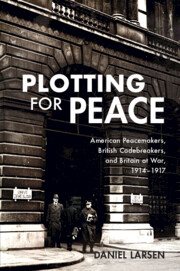2 results
5 - The Gamble
-
- Book:
- Plotting for Peace
- Published online:
- 26 March 2021
- Print publication:
- 01 April 2021, pp 137-158
-
- Chapter
- Export citation

Plotting for Peace
- American Peacemakers, British Codebreakers, and Britain at War, 1914–1917
-
- Published online:
- 26 March 2021
- Print publication:
- 01 April 2021

